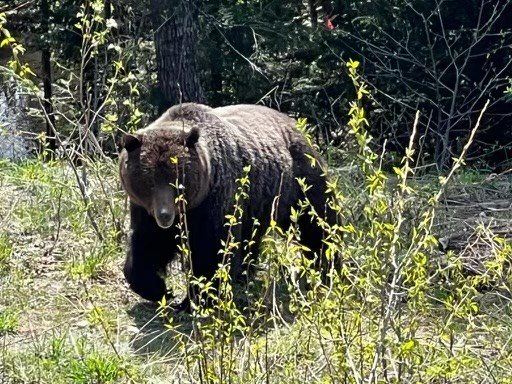The Conservation Officer Service is asking homeowners in the Port McNeill area to ensure their garbage, pet food and bird seed are securely stored, after a grizzly bear was spotted in the area.
They say the bear likely swam to Vancouver Island from the Central Coast, island hopping with short swims from the mainland. The bear is most likely a male in search of new food sources such as fish and berries, but will also hunt elk and deer, they said.
While sightings of grizzlies on Vancouver Island were rare in the past, it’s becoming more common, said Gerald Whalley, a former hunting guide and the representative of Kyuquot, Nootka and Sayward on the Strathcona Regional District board.
A 225-kilogram grizzly was a frequent visitor to the village of Sayward in the summer of 2020.
“We started seeing more bears after the provincial government banned trophy hunting of grizzly bears in B.C. in 2017,” said Whalley. “Every year, the young males are forced from their territory by other males. It’s not surprising to hear of one on the Island — they are good swimmers.”
The grizzly bear population in B.C. is estimated to be around 15,000, as of 2018. Under treaty rights, First Nations are still allowed to harvest grizzlies for food, social or ceremonial purposes.
The Conservation Officer Service is asking the public to give the bear space to move on and not try to approach the animal to take pictures. While it is aware of the bear in the area, it says it has not received any reports of it displaying aggressive behaviour or conflicts.
The last grizzly spotted in the area remained largely in the Salmon River estuary, but was seen several times in Sayward. It was observed grazing on a patch of brush across the road from the village’s school and took a dip in a pond in the village.
Whalley, who used to be a hunting guide in the Dease Lake area, said people should exercise extreme caution and remain at a safe distance, as a charging bear can reach speeds of up to 60 feet per second.
He said that the bear will likely return to the mainland in late summer in search of a mate.
No grizzly bear dens have ever been reported on Vancouver Island.
The Conservation Officer Service said it is monitoring the situation and asks the public to report any sightings to the Report All Poachers and Polluters hotline at 1-877-952-7277. For more information on human-wildlife conflict, or to report an incident, go to bit.ly/43Q84HX.
>>> To comment on this article, write a letter to the editor: [email protected]



